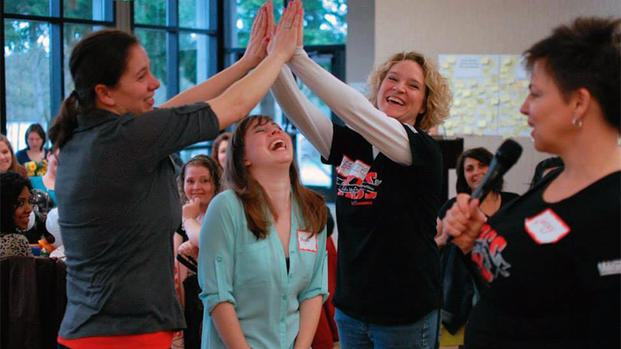It's one of the great struggles of modern military spouse leaders: how do we get a generation of spouses who only know to rely on virtual support to come out of their homes and connect in person?
That's a question Corie Weathers, a licensed therapist and mental health clinician, Army chaplain's wife and the 2015 Military Spouse of the Year has been thinking a lot about. She wants to see Army marriages last and Army spouses as mentally strong as possible. And she knows that means they need real life, in-person friends in addition to those great virtual support groups on which we've all come to rely (like SpouseBuzz).
But she also knows that those military spouses are different from the ones of earlier generations -- and that the senior spouses who are often in charge of the programs that help them connect may not understand how to get them involved. We all know that spouses are great at connecting with each other in the midst of a crises. A really tough deployment or a local natural disaster brings people out of their homes searching for that human, face-to-face comfort. But how do make it happen all the time?
It's not by just ditching all the virtual support and pushing people to only show up for things, Corie said. Instead it's about combining the two while ramping up the in-person, personal connection efforts. Here are her four suggestions that she gave a few reporters, including your's truly, at the annual 2015 Association of the United States Army conference.
4 Ways to Help Modern Military Spouses Connect
1. Return to some of the small stuff. Corie said we need to bring some of the face-to-face interaction back on the unit or neighborhood level. "We're talking about things like how do you have a welcome packet that's delivered to your door where you say 'Hi, my name's Corie, if you need me, here's my number ... and if you don't, that's OK," she said.
While the military services do have "sponsor" programs on each base, they often aren't run well or those who participate don't follow through. Doing that contact on a unit level could make it even more personal -- and better executed.
2. Offer events after hours. "I hear from a lot of spouses 'the play groups are great ... but if they're not past five o'clock I don't get to go to them,'" she said. With surveys showing most spouses either employed or wishing they had work, finding time to do events during off-hours is crucial.
3. Ditch the rank-specific events. Corie said while she still thinks the traditional officer spouse level coffee groups serve an important purpose, ignoring rank structure for all other spouse groups is important. "If you listen to the overall culture they're all saying they're ready to marry enlisted and officer," she said. "I think the overall culture is asking for a shift on how we bring all the spouses together somehow."
4. Help spouses feel like they are part of something bigger than themselves. Military life is a lot easier to wrangle when you know you're doing it for a reason. Call it a morale boost, call it mind games, but helping spouses feel like they are a part of something important goes a long way to helping them connect. "I believe that when spouses feel like they are part of something bigger than themselves, that's where they really connect and want to get involved," she said. "If we can market it in that way, if spouses and families feel like they're still part of this amazing organization of the military and they get to be part of it, they can feel like they're part of something great than themselves, and they get to take on this role of being a military family, and they're going to want to do that again," she said.









